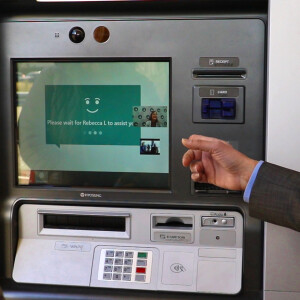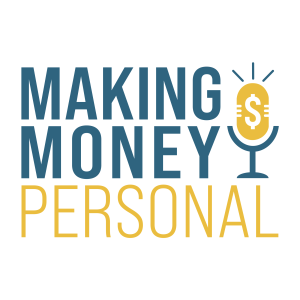Episodes

Tuesday Oct 03, 2023
How ITMs Improve Your Banking Experience - Money Tip Tuesday
Tuesday Oct 03, 2023
Tuesday Oct 03, 2023
As banking technology continues to advance, the focus of many institutions is on providing top quality interactions with greater flexibility and control for you, the user. With the implementation of Interactive Teller Machines (ITMs), the goal is to provide more services and convenience while still maintaining human interaction and engagement.
With ITMs, you get the best of both worlds: the flexibility and convenience of self-service banking with the human service and interactions you may prefer. Stay tuned to learn more about the benefits of self-service banking.
Links:
Check out TCU University for more financial education tips and resources!
Follow us on Facebook, Instagram and Twitter!
Learn more about Triangle Credit Union
Transript:
Welcome to Money Tip Tuesday from the Making Money Personal podcast.
Today’s banking tech (also known as financial or fin tech) is amazing. You can do so many banking transactions on your phone or computer.
But what if you need to do something different that you can’t do online? You can call, visit a branch, or now, use an ITM, which is the next generation of ATMs.
Okay, so they’re not the newest tech, they’ve been out since the 2010s, but they’re beginning to build momentum in the banking world. As of 2022 only 41% of consumers have used an ITM, and 56% don’t even know what one is.
If you’re not sure what an ITM is or why you’d use one, here are a few things they do like an ATM and some additional capabilities for improved service.
Like an ATM, all ITMs give you the capabilities to:
Check account balances
Deposit cash and checks
Withdraw cash
Transfer money
But ITMs are more like upgraded ATMs and their greatest benefit is you can speak directly to a live person who can answer questions and provide many of the same services you can expect at the teller line
You can make loan or credit card payments
You can cash checks
You can withdraw money without a debit card
You can ask specific questions about your account information
You can even ask their favorite food or what they did last weekend.
When would you need to use an ITM? The short answer is any time you use a regular ATM or your branch drive-up and teller line service. Here are some examples:
Use an ITM when you need cash in different denominations
If you need different types of cash for a yard sale, budgeting purposes, or any other reason you don’t need to go to the teller line for that.
ITMs can give you different options to choose from and can dispense smaller and larger bills depending on the machine.
Use and ITM if there’s a long line in the branch
If you’re at a branch and there’s a long line to get to the tellers, look for an ITM and pop over there.
You’ll be able to do most transactions you’d do at the line, but all self-service.
Many branch lobbies have an ITM right inside the building, so if you don’t want to wait for the next teller, step over to the ITM for faster service.
Use an ITM if you’re on the go but don’t want to get out of your car
With ITMs you can avoid going in the branch and use the machine like you would a regular drive-up.
If you’re in a rush, need teller service, but don’t want to park to go into the branch, drive right on up to an ITM and you can still do the transactions you need with service from a live person.
ITMs save you precious time and offer you more capabilities by offering a robust self-service banking experience with the ability to connect with a live person if needed.
Next time you visit a branch or pass by an ITM, give it a try. You’ll love the experience.
If there are any other tips or topics, you’d like us to cover, let us know at tcupodcast@trianglecu.org. Like and follow our Making Money Personal FB and IG page and look for our sponsor, Triangle Credit Union on social media to share your thoughts.
Thanks for listening to today’s Money Tip Tuesday and make sure to check out our other tips and episodes on the Making Money Personal podcast.
Have a great day!

Tuesday Sep 26, 2023
What You Should Know About Online Savings - Money Tip Tuesday
Tuesday Sep 26, 2023
Tuesday Sep 26, 2023
You probably already know that having a savings account is important. You can save up your money for your next big-ticket purchase, retirement, or an emergency fund. But did you know that there are loads of benefits to using an online savings account?
Here’s what you need to know about the benefits of online savings and what to look for.
Links:
Learn more about the benefits of an Online Savings account
Check out TCU University for more financial education tips and resources!
Follow us on Facebook, Instagram and Twitter!
Learn more about Triangle Credit Union
Transcript:
Welcome to Money Tip Tuesday from the Making Money Personal podcast.
To begin with, not only does an online savings account keep your money safe, it can also help you build wealth. Financial institutions will often pay you interest for keeping your money with them. The interest rate, which is a percentage, will be multiplied by how much money you have in your online savings account. The financial institute will then add that amount of money to your savings.
You’ll also want to look at the annual percentage yield, or APY. The APY is how much money you will make on your balance, with compounding included.
In other words, when you are looking for a place to keep your savings, you’re going to want to compare different financial institutions’ online savings rates and APYs. The higher the interest rates, the more money you will make. Online savings typically offer a higher interest rate than a traditional savings account so if you’re looking to earn a higher yield, try an online savings account.
Keep in mind that rates are subject to change and are usually based on the Federal Reserve, so you will want to keep a close eye to see if your rate decreases; if rates decrease, you may want to consider switching where you keep your money.
Another benefit of online savings is simple convenience. You can access your funds quickly within your online or mobile banking and can transfer money to and from other accounts instantly. All you need for access is a device and an internet connection. This is especially useful if you have an emergency and need to move some money fast. You don’t need to wait in line at a bank or on hold on the phone.
Having your money in an online savings account isn’t just convenient, it’s secure too. If your financial institution is FDIC-insured, your money is safe in case the institution fails. It is insured up to $250,000 per account. If you bank at a credit union, your money is insured for the same amount through the NCUA. Since it’s a strictly online account, it’s also secured through encryption, as well as multi-factor authentication, which makes it more difficult for fraudsters to steal your money. Online savings accounts are just as secure as your other financial accounts.
One thing you’ll want to look out for when shopping are the online savings account fees and minimum balance requirements. Some financial institutions have monthly maintenance fees or fees if your balance drops below a certain amount. These fees can take away any interest you might have earned in your savings. Look for a financial institution with no fees on savings. You also want to check the minimum deposit requirements. Some online savings accounts can require a minimum amount of money to open the account, which can range anywhere from $100 to $5,000.
Our sponsor, Triangle Credit Union, offers an online savings account with no monthly maintenance fees and only requires a minimum of $100 to open the account.
If there are any other tips or topics, you’d like us to cover, let us know at tcupodcast@trianglecu.org and don't forget to like and follow our Making Money Personal Facebook and Instagram pages and look for our sponsor, Triangle Credit Union on Instagram and LinkedIn to share your thoughts.
Thanks for listening to today’s Money Tip Tuesday and be sure to check out our other tips and episodes on the Making Money Personal podcast.
Have a great day!

Thursday Sep 21, 2023
Episode 61: Business Funding and Planning Resources | Tuesday Perkins (SBA)
Thursday Sep 21, 2023
Thursday Sep 21, 2023
Business Funding and planning can be a stressful part of running a business. If you're new to the business world or a seasoned owner looking for more resources to expand your enterprise, this episode is for you.
In this episode I chat with Tuesday Perkins from the Small Business Administration about the many ways they work to provide the best tools and opportunities for anyone looking to start or grow a business.
Links:
Learn more about Small Business Administration and it's resources for NH businesses
Search the SBA calendar of events
Contact Tuesday Perkins at tuesday.perkins@sba.gov or call her at (603) 225-1404
Learn more about Triangle Credit Union's Commercial and Business Services
Check out some of these other podcast episodes about business resources:
Starting Your Business Relationship
Boosting Your Business Resources with SCORE
Why You Need a Business Exit Plan
Steps to Start Your Own Business
Check out TCU University for more financial education tips and resources!
Follow us on Facebook, Instagram and Twitter!
Learn more about Triangle Credit Union
View episode transcript.

Tuesday Sep 19, 2023
Features of Online and Mobile Banking - Money Tip Tuesday
Tuesday Sep 19, 2023
Tuesday Sep 19, 2023
Banking technology has evolved immensely over the years. What once began in the 1980’s with dial-up services to access accounts on your home computer has developed into the extensive, and somewhat essential, online and mobile banking we use today.
Links:
Learn more about Triangle's Online Banking and Mobile Banking tools
Watch our Remote Deposit Capture tutorial
Learn more about our Mobile Banking app and it's features
Check out TCU University for more financial education tips and resources!
Follow us on Facebook, Instagram and Twitter!
Learn more about Triangle Credit Union
Transcript:
Welcome to Money Tip Tuesday from the Making Money Personal podcast.
Online Banking refers to transactions conducted through a financial institution's website via a web browser on any device with an internet connection (for example-- a computer, tablet, or smartphone). With online banking, you do not need to download an application which is why it’s a simple and popular option for many.
Mobile Banking is typically conducted through a financial institution’s mobile app, however many FIs also offer some mobile banking capabilities through SMS texts.
Online and Mobile banking is convenient for those who want to manage their finances from home or on-the-go. Both provide:
Account Information
Transaction History
Fund Transfers
Bill Pay
Card Management
Budgeting Tools
and more!
Online Banking and Mobile Banking offer similar tools and features to keep your banking experience easy and convenient.
If you’re new to online or mobile banking here are a few of the features you should consider setting up and using right away.
Text Alerts. For those who don’t have a smartphone, text alerts allow credit union members to receive notifications directly to their phone with an SMS text when large deposits or large withdrawals are made, weekly account balance updates, or when their account balance falls below a specific amount, to name a few. To sign up for these notifications, log into your online banking account (on your computer) and enter your phone number.
Remote Deposit Capture. Through your financial institution’s mobile app, you can use remote deposit capture to deposit a check without stepping a foot into a branch. RDC typically only takes a minute or two which makes it a popular option for those with busy lifestyles. If you don’t have a smartphone, you can still deposit checks from home through your online banking account using a scanner.
Push Notifications. Similar to text alerts, push notifications can be enabled to alert you when specific actions occur on your account. These can include spending transaction notifications, low balance, large deposits or large withdrawals, etc. To enable push notifications, log into your bank or credit union’s mobile app and toggle these notifications on.
Both mobile and online banking allow you to manage your money in ways that work best for you. If you haven’t created your online or mobile banking account yet, what are you waiting for? Take control of your finances today!
Set it up now at trianglecu.org.
If there are any other tips or topics, you’d like us to cover, let us know at tcupodcast@trianglecu.org. Like and follow our Making Money Personal FB and IG page and look for our sponsor, Triangle Credit Union on social media to share your thoughts.
Thanks for listening to today’s Money Tip Tuesday and be sure to check out our other tips and episodes on the Making Money Personal podcast.
Have a great day!

Tuesday Sep 12, 2023
Why Not Get Paid Two Days Early? - Money Tip Tuesday
Tuesday Sep 12, 2023
Tuesday Sep 12, 2023
If someone offered to pay you earlier than expected, wouldn’t you be ecstatic? If you have Direct Deposit with your employer, then you may have the option of getting paid up to two days earlier! Listen to this tip to learn more.
Links:
Learn more about Triangle's checking accounts with Early Paycheck
Download the direct deposit form to get started
Check out TCU University for more financial education tips and resources!
Follow us on Facebook, Instagram and Twitter!
Learn more about Triangle Credit Union
Transcript:
This is Money Tip Tuesday from the Making Money Personal Podcast.
I know, getting paid up to two days early from your employer sounds too good to be true, but it is, in fact, true and here’s how it works: Most companies send payroll information up to two days before funds arrive. If your credit union offers Early Paycheck (or a similar product/service), the credit union can release your paycheck into your account early.
To take advantage of this, there are three requirements that must be available to you:
(1) You must have a direct deposit service set up with your credit union, which means your employer must offer direct deposit. If you’re not sure that your employer offers direct deposit, ask your HR department or manager if this is available to you.
If Direct Deposit is available, sign up as soon as possible. There are many benefits of Direct Deposit that will be presented later—at the top of list is Early Paycheck. Setting up Direct Deposit is simple. Fill out a Direct Deposit form, which you can get either from your credit union or employer. All forms pretty much have the same information but look a little different. You will need your routing number of your financial institution (this can be found on their website), the account number where you want your paycheck deposited (this is usually a savings or checking account), and a voided check.
(2) Your credit union or financial institution must participate in the early payment or paycheck option to have funds available for you. Availability of your payroll funds is based on the release of payment information. Sometimes there can be issues with the electronic transfers, so keep in mind that you may run into delays on occasion. If these issues are ongoing, you should contact your HR/Payroll Department or the credit union for additional information.
(3) Your company’s payroll must be on board with transferring the payroll files electronically. Many companies have third party services that process payroll for their employees. Payroll companies, like ADP, are consistent about processing and sending files in a timely manner.
Now that you know how it works, let’s go over some benefits of Early Paycheck with Direct Deposit:
First, it’s all about cash flow. The sooner you have access to your paycheck, the better—whether that means you use it to pay bills or your best friend for picking up the dinner tab last night!
Better cashflow usually makes it easier to manage your money because you know when funds are available to you. This is tremendously valuable when you are on a budget. Direct deposit makes your life so much easier! Your paycheck is automatically deposited at your credit union so you don’t have worry about remembering to deposit your check yourself!
Plus, electronic fund transfers are safe and secure. You don’t have to think about where your paycheck is or losing it! You also have access to your funds faster. When the electronic transfer is received and applied, your payroll funds hit your account without any hold restrictions, which means you can use your money as soon as it is deposited.If your employer offers Direct Deposit, take advantage of this huge time saver!
For those who may not have Direct Deposit available, we recommend Remote Deposit Capture (RDC). Most institutions require registration for this service, but once RDC is turned on, use your mobile banking to deposit checks from anywhere.
RDC is convenient. Just endorse your check (be sure to read the endorsement instructions within your app) and follow the photo prompts on your phone. The prompts will ask you to take a picture of the front and back sides of your check. Hit submit and you’ll get a confirmation that your check has been submitted to your institution.
For more information about RDC as an option, contact your credit union.
If you have any additional tips or would like us to cover a specific topic, email us at tcupodcast@trianglecu.org.
For more great content, be sure to subscribe to our Making Money Personal podcast wherever you listen to podcasts and follow us on Facebook.
Special thanks to our sponsor, Triangle Credit Union and to you for tuning in!
Have a great day!

Tuesday Sep 05, 2023
Top Reasons to Use Your Debit Card - Money Tip Tuesday
Tuesday Sep 05, 2023
Tuesday Sep 05, 2023
When it comes to payment options you may think that credit cards are the most popular ways to pay. But you may be surprised that that’s not actually the case. If I told you debit cards are the top used payment method for Americans would that surprise you?
Links:
Look into more credit/debit card statistics and trends
Read more about American household debt statistics
Learn more about our debit card features and benefits as well as Identity protection with our Better Checking account
Check out TCU University for more financial education tips and resources!
Follow us on Facebook, Instagram and Twitter!
Learn more about Triangle Credit Union
Transcript:
Welcome to Money Tip Tuesday from the Making Money Personal podcast.
I think it’s safe to say that we all love to spend money and we certainly have a lot of options to choose from when we do so.
When it comes to paying credit and debit cards are the top preferred methods. But, which one do people use more?
According to a 2023 Forbes survey, 54% of Americans use a debit card as a primary payment method. That same survey stated that only 36% use a credit card (physical or virtual).
Why are debit cards so popular? Well, there are few reasons why people haven’t yet abandoned the debit card when they make purchases.
Debit cards are more accessible. Because they're not dependent on a credit score, they’re available to people with lower or no scores at all. Even if your credit isn’t in great shape, you can still get one because all you need is a checking account. This makes them especially useful to teens and young people who haven’t established any credit yet. Debit cards give many people convenient access to their funds so they can pay online and in stores without needing cash or dare I even say it... a check.
One little caveat to remember though is that debit cards do not help you build credit so you’ll need to explore other options if you’re looking to establish or boost your credit score.
Debit cards are just as convenient as credit cards. You can add to your phone’s wallet, use them in online checkouts and now the newest cards enable you to pay at contactless terminals. And just like many credit cards, you get access to card controls to turn it off and on, set up notifications when you make a purchase and set up travel alerts when you’re ready to venture across states or out of the country.
You can still get rewards. Everyone loves to gush about the cool rewards they get through their credit cards, but with a debit card you can get rewards too. Your debit card likely participates in a rewards program that gives you a percentage of cash back or other special offers just for using it with certain vendors. At Triangle, we offer a Purchase Rewards program where you can earn a percentage back when you activate the vendor offer and use your card with that vendor.
Debit cards don’t charge an annual fee. Popular credit cards that offer attractive rewards and offers typically come with an annual fee. The better the offers, usually the more expensive the fee. If you have one of these cards, you may be spending anywhere from $95 a year to over $400 a year. Debit cards don’t charge you anything to use them so you don’t have to worry about that annual surprise charge.
Debit cards are quick to replace. If you lose it, break it or anything happens to it it’s really easy to get a new one. At Triangle we have Debit on Demand which offers instant issue cards. If you need a new card just walk into a branch and within a short time you’ll walk out with a brand new one. Try doing that with a credit card.
And the last reason is probably the biggest one. Debit cards don’t contribute to debt. According to a Motley Fool survey, Americans are carrying over $17 trillion in debt, with just over 1 trillion of that being credit card debt. TransUnion reported that on average, individual card holders are carrying around $5,700 in credit card debt. If you’re debt averse or trying not to get deeper into debt, a debit card will be your best friend. Using a debit card forces you to pay closer attention to how much you’re spending to avoid overspending and makes it easier to maintain control of your finances.
If you have a debit card but aren’t using it much. I hope this tip will help remind you to take it out and use it a little more.
If you haven’t set one up yet here are just a few things to keep in mind when you get started.
Remember to set up overdraft protection so you don’t get charged fees in case you accidentally charge more to your card than what’s available in your checking account.
Make sure to register your debit card with an identity theft protection service like Triangle’s ID protect with our Better Checking account so it’ll be constantly monitored for fraud.
Familiarize yourself with the card controls so you know how to turn your card off and on and to set notifications to stay on top of every transaction
Last but not least, if you use a mobile wallet, remember to add your debit card so you can use it the next time you pay with your phone.
If there are any other tips or topics, you’d like us to cover, let us know at tcupodcast@trianglecu.org. Like and follow our Making Money Personal FB and IG page and look for our sponsor, Triangle Credit Union on social media to share your thoughts.
Thanks for listening to today’s Money Tip Tuesday and check out our other tips and episodes on the Making Money Personal podcast.
Have a great day!

Tuesday Aug 29, 2023
Is It Time To Move Your Money? - Money Tip Tuesday
Tuesday Aug 29, 2023
Tuesday Aug 29, 2023
If you’re with a big bank that requires you to carry a hefty balance in your checking to avoid a maintenance fee, is it time for you to move your money?
Listen to this tip to learn how switching to a credit union can save you from the struggle and annoyance of high bank fees.
Links:
Learn more about Triangle's checking accounts with no minimum balance
Learn about Triangle's credit union mission and core values
Read the Reuter's article about Bank of America's excessive fees
Read the Investopedia article about the Benefits of Using a Credit Union
For more financial education tips and resources visit TCU University!
Follow us on Facebook, Instagram and Twitter!
Learn more about Triangle Credit Union
Transcript:
I was recently in a meeting and one of our branch managers mentioned there were several new account openings at her branch during the week. When branch staff asked these new members how they heard of the credit union, their answers varied. Some provided feedback that they saw us at some community events, and another responded one of their family members had referred us to them.
What was interesting is that while they had varied reasons for how they heard about us, their answer to the next question was the same. Her question was: why are you moving from your current bank to the credit union? All three answered: I’m tired of the high minimum balance requirement on my checking account. They moved their money—if you’re with a big bank that requires you to carry a hefty balance in your checking to avoid a maintenance fee, is it time for you to move your money too?
This is Money Tip Tuesday from the Making Money Personal podcast.
A minimum deposit for a checking account is not uncommon. Most financial institutions require a minimum deposit to open an account—whether that money is deposited into a savings or a checking. It’s this initial funding that establishes your account and relationship with the financial institution. According to Forbes, you usually need to make an initial deposit between $25 and $100 to open a savings or checking account. For other deposit products, such as Certificates of Deposit or Money Markets, the minimum to open those accounts is higher and varies depending upon terms.
For higher yield deposit accounts, such as Money Markets or Online Savings, the minimums are traditionally higher. The issue most consumers have with high minimums rarely involves these types of deposit products.
The frustration most people have is not about the initial minimum deposit, it’s about the required minimum balance in the checking account to avoid the monthly maintenance fee; sadly, this amount, for some big banks, has increased to unreasonable levels.
Most consumers are looking for excellent value. That’s why people bank at credit unions—typically there are fewer fees, or low fees and competitive rates for both deposit and lending products.
If you go back to our three new members, they were all facing increased minimum daily balance requirements with their checking because the balance on their regular checking, which was not high yield checking, increased to $1000. This means their checking account minimum increased to a level they weren’t comfortable with (and for some consumers, a balance that is unaffordable), which is why they decided to move their money.
So, what happens if your balance falls below $1000? The short answer is you will be hit with a monthly maintenance fee, which opens up a whole other concern.
Big banks are notorious for imposing big fees. Bank of America (BOA) was fined $250 million, earlier this month, for a series of financial violations, including junk fees.
According to Reuters, “Bank of America reaped hundreds of millions of dollars by charging multiple fees to customers who did not have enough funds in their accounts from February 2018 until February 2022, the CFPB said in a statement. Consumers could not reasonably expect or understand they would be hit with $35 fees each time the bank declined to pay a single transaction, regulators said.”
If you find yourself at the mercy of big banking fees, and you’re tired of high minimum balance requirements on your accounts or transaction fees at the teller line, it’s time to move your finances to your local credit union because, honestly, we look at banking differently.
I work for a credit union, so I became a believer a long time ago, but for those who are exploring new options, the Credit Union movement was founded on the principle of “people helping people,” not feeing our members to death!
According to Investopedia, one of the top reasons to bank at a credit union is because of lower fees, “credit unions are free to pass surplus money to members in the form of fewer fees, more services, lower interest on loans, and higher dividends on deposits.”
Fees are the cost of doing business but for financial institutions with a conscience, there are limits. For instance, most credit unions are reluctant to raise fees and before any new fees are imposed, they are scrutinized at all management levels. Triangle Credit Union eliminated five fees this year; sadly we had to raise a loan origination fee because our costs increased exponentially.
If you’re already a member of a credit union, let me say, “Well done! You’re a financial genius!” If you aren’t, you’ve probably lost $16 while listening to this money tip! Just kidding.
Seriously, I have several friends who recently moved their accounts to a local credit union because of financial safety and soundness, lower minimum balance requirements in checking, and fewer fees. So, whether you’re just starting your financial journey or a seasoned professional with a great salary, credit unions are the right move.
Have any more great tips? If so, please contact us tcupodcast@trianglecu.org. For more great tips and full episodes, subscribe to the Making Money Personal podcast, wherever you listen to podcasts and follow us on Facebook!
Many thanks to our sponsor, Triangle Credit Union, and you—our listeners!
Have a great day everyone!

Thursday Aug 24, 2023
Episode 60: The Protective Benefits of a Better Checking Account | Jennifer Carter
Thursday Aug 24, 2023
Thursday Aug 24, 2023
What matters to you matters to us as a campaign that our sponsor Triangle Credit Union introduced earlier this year. In an age of identity fraud and high stakes scams, we're going to dive into identity protection with Triangle's Product and Service Specialist, Jennifer Carter.
Stay tuned to learn how Triangle is protecting their members and why your financial institution should too!
Links:
Learn more about our Better Checking account with Identity Protection
Learn more about why you should consider identity protection for you and your family in our past podcast episode: Why You Should Consider Identity Theft Protection
Log into your ID Protect account at idprotectme247.com
Explore more financial education resources at triangleuniversity.org
Follow us on Facebook, Instagram and Twitter!
Learn more about Triangle Credit Union
View episode transcript.

Tuesday Aug 22, 2023
7 Elements to Market Your Business on a Budget - Money Tip Tuesday
Tuesday Aug 22, 2023
Tuesday Aug 22, 2023
If you want to boost your business’s brand recognition and get more attention from potential clients or customers, you’ll need to put some effort into marketing.
You may think that marketing isn't possible without a hefty budget, but that can’t be farther from the truth. There are ways to market your business in a cost-effective and budget friendly way.
Links:
Explore some of these popular tools and websites to market your business on a budget:
Canva
Envato
Fiverr
Wix
Squarespace
Wordpress
Vistaprint
Custom Ink
For more financial education tips and resources visit TCU University!
Follow us on Facebook, Instagram and Twitter!
Learn more about Triangle Credit Union
Transcript:
Welcome to Money Tip Tuesday from the Making Money Personal podcast.
When it comes to marketing your business, it doesn't have to be expensive or complex to reach new potential customers. Marketing can make business owners feel intimidated and hesitant to take the next step. However, with certain sources, marketing your business couldn’t be much easier and once you have a plan, promoting your business will get better over time. Let’s look at 7 elements to help market your business on a budget.
Consistent Branding
Having good, consistent branding will help your business become more recognizable to current and potential customers. If you're just starting your business, you may not have branding guidelines established yet. If you’ve been in business for some time, you probably already have your brand logo, colors, and fonts in your marketing materials. These marketing materials are your website, social media platforms, print and digital materials, promotional items, and business emails.
If you want to create your logo on your own, there are free websites and applications available to you. Canva and Envato are two platforms that allow you to customize or create free logos for your brand. These platforms also provide templates for your marketing materials including website, social media, and print/digital materials. If you’re new to creating branded content, this is a great way to dive into it while keeping your branding consistent.
If creating a logo and other branding material isn’t for you, you can also hire a graphic designer to create your logo and marketing materials for a low cost. Fiverr is a great resource to find graphic designers that will create a logo and other marketing materials for you. If you choose to use Fiverr or something similar, make sure you choose someone that has a design style you like and stay firm on the finalized designs to ensure they deliver what you’re looking for.
Create a Website
When it comes to marketing your business, creating a website is a great place to start. Your website does not have to be too complex; it can simply provide basic information about your business, product or service, the team, and your contact information. As your business grows, you can advance your website by including a blog, Q&A, or even a shop page to sell your product.
When considering the domain, or URL, for your website, make sure it matches or is close to your business’s name. For example, for a business called Dover Cold Brew Company, the domain name should be www.dovercoldbrewcompany.com, www.dovercoldbrewco.com, or www.dovercoldbrew.co.
Take some time to think about what you want your website to look like and the story you want to tell. Websites don’t need to be completed. For a small business, 3-5 pages should be plenty. Make sure you focus on the products or service you’re selling and how potential customers can get in touch with you.
Once you have an idea about the content you want to put on your website and the domain name, you will need to decide which platform you will build your website with. Wix, Squarespace, and WordPress are three popular website-building sites. These sources are great for business owners that are
looking to promote their products and service without the hassle of coding the web pages themselves. There are plenty of templates that can be dragged-and-dropped from these sites, and all you will need to do is input your information. If you prefer, you can outsource this task as well by hiring a web designer to design your website.
*Important note: domain names do have a price tag depending on the website platform or web host you’re using. For some platforms, the domain name is free for the first year and then will charge a yearly fee afterwards.
Social Media
Social media is a fantastic way to promote your business with little to no cost. Facebook, Instagram, YouTube, and LinkedIn are the most popular channels when you are first starting out. The social media content you post on these channels can cover various aspects of your business.
YouTube is a great platform for long-form, educational videos. Instagram is useful for photos or short-form videos that focus on the features of your product or service. Facebook is a platform for photos, videos, or longer posts that include links for consumers. For company related developments, new products/services and networking with similar businesses, use LinkedIn.
A good step is to develop a strategy plan for posts across all platforms to show off your business using photos and videos along with great captions below them. These social media posts can use templates and formats from Canva, a free source that is quickly accessible and easy to use for anyone creating content.
Email Marketing
Email marketing is direct messaging to past customers or potential customers that have signed up to receive more information on your business, products, or services via email. You can utilize this form of marketing to promote new releases or send coupons/discount codes to entice your customers to make more purchases. These keep your customers updated and can attract them to come back and purchase more of your products or service. Email marketing can also be a great way to advertise events or sponsorships.
Free Trials & Coupons
Depending on the product and service your business provides, customers are always going to be cautious about what they're buying and who they’re buying from. If you offer a free trial or a coupon to your business or service, it can comfort potential customers and gain trust in you and your business. For example, if you have a home improvement business, it would be beneficial to offer a free roofing consultation rather than the client being hesitant about buying a new roof. These offers allow customers to see what your business is all about and what your product or service can do for them.
Events & Sponsorships
Participating in or sponsoring local community events can bring buzz for your business and can be a great way to network with potential partners while connecting with your community. Local events will also give you the opportunity to interact with current customers and make that brand trust stronger. Events give you the chance to provide giveaways such as promotional items or print materials that go
into further details on your products and services. Don’t forget to bring your business cards to pass out to potential customers or vendors.
Print Materials & Promotional Items
Print materials and promotional items are great to attract customers and make your business stand out. This can be a brochure, a handout flyer, or even a small giveaway like a pen with your business’s name across it. These materials can be created by sources like Vistaprint, Canva, and Custom Ink.
All these elements are essential to marketing your business without breaking the bank. Affordable resources can help you improve your business, gain customer attraction, and gain trust in the community. Research will always be an important factor towards these marketing elements to find the right source for the right price.
If there are any other tips or topics, you’d like us to cover, let us know at tcupodcast@trianglecu.org. Like and follow our Making Money Personal FB and IG page and look for our sponsor, Triangle Credit Union on social media to share your thoughts.
Thanks for listening to today’s Money Tip Tuesday and be sure to check out our other tips and episodes on the Making Money Personal podcast.
Have a great day!

Tuesday Aug 15, 2023
What To Keep In Mind When Buying Bulk - Money Tip Tuesday
Tuesday Aug 15, 2023
Tuesday Aug 15, 2023
Have you ever run out of something and wished you had bought more when you were at the store? Buying in bulk can often fix this problem. You get more bang for your buck, with bulk prices generally being cheaper than buying the same amount of the item individually.
Plus, you also have a bigger supply and won’t have to go shopping as often. However, there are some items that you do not want to buy in bulk as they just aren’t worth it. Here are some items to put on your bulk shopping list, and some you should remove.
Links:
Follow us on Facebook, Instagram and Twitter!
Learn more about Triangle Credit Union
Transcript:
Welcome to Money Tip Tuesday from the Making Money Personal podcast.
First on our bulk shopping list is food. Food can be tricky when buying in bulk, as it can expire if you don’t eat it fast enough. Canned goods are a great food to buy in bulk. When buying them in bulk, the prices are typically 30% percent cheaper than buying them individually. Always check the expiration date on the cans first, as you don’t want to buy a whole bunch of them if you don’t think you can eat them all before they expire.
If you have a big freezer, buying meat in bulk is a great idea. If you go to a local butcher store, you can get large quantities of meat for cheaper prices than you find in a grocery store. However, you may want to get a vacuum sealer to avoid freezer burn.
If you drink coffee once (or twice) a day, you should also buy that in bulk. Buying individual bags, pods, or drinks can quickly add up over time. Buying it in bulk is cheaper, especially if you drink a lot.
Pasta is another food you should buy in bulk. Pasta doesn’t take up a lot of space in your pantry, plus when it is sealed properly, it can last up to two years.
While not for you to eat, pet food is a great investment when buying in bulk. Chances are you feed your pet the same thing every day, so you know that you will have to keep buying it. Buying pet food in bulk allows you to save money on pet expenses and keep your pet happy.
However, there are definitely some foods that you should not buy in bulk. One example of this is fresh fruit. Fresh fruit doesn’t last very long, and chances are you won’t be able to eat all of it before it expires. Buying fruit in smaller quantities allows you to eat all of it before it expires. Plus, when buying fresh fruit in bulk, you most likely won’t inspect the fruit to see if it’s good to eat. If you still plan on buying fruit in bulk, try buying frozen fruit, as it will last longer.
Another food you shouldn’t buy in bulk is nuts. Although it is tempting since they are a lot cheaper to buy in bulk, the high fat content in nuts can make them turn rancid faster. Similarly, spices are another item to not buy in bulk, as they begin to lose their flavor after 6 months. A good rule of thumb is if the food has a close expiration date, don’t buy it in bulk.
Moving on from food, paper materials are always a great purchase in bulk. Tissues, toilet paper, and paper towels are a great investment, as you will always need them, they don’t go bad, and they are cheaper when you buy them in bulk.
Likewise, all cleaning supplies are great and cheaper in bulk. This can include laundry detergent, soap, shampoo, toilet cleaner, and even toothpaste.
However, if there’s an item that you can buy in bulk but don’t use very often, don’t buy it. Just because it might be cheaper in the long run, doesn’t make it worth it. Remember, you still have to store all of this stuff at your house. Only buy what you know you will use.
If there are any other tips or topics you’d like us to cover, let us know at tcupodcast@trianglecu.org and don't forget to like and follow our Making Money Personal Facebook, Instagram, and Twitter pages and look for our sponsor, Triangle Credit Union on Instagram and LinkedIn to share your thoughts.

Financial Lessons & Tips
Join us for fun, relevant financial topics that provide you with resources to help you make financial decisions. The Making Money Personal Podcast talks about the impact that money has on your personal and professional life. Our podcast examines trends and topics with support from industry professionals.





